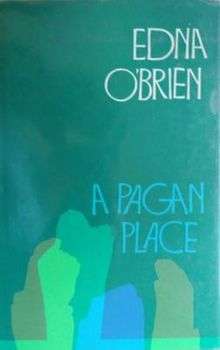A Pagan Place (novel)
A Pagan Place is a 1970 novel by Irish writer Edna O'Brien.[1][2] The book was first published on April 16, 1970, by Weidenfeld & Nicolson and follows a young girl in the 1930s and 1940s. In 1972 A Pagan Place was adapted into a stage production,[3] which received mixed reviews.[4]
 First edition | |
| Author | Edna O'Brien |
|---|---|
| Country | Ireland |
| Language | English |
| Publisher | Weidenfeld & Nicolson |
Publication date | April 16, 1970 |
| Media type | |
| Pages | 223 pages |
| ISBN | 0-297-00027-6 |
Style
A Pagan Place is narrated in second person in its entirety. As Shahriyar Mansouri argues, such a "melodic" narratorial voice, presented through the mouthpiece of second-person narrator signifies a lost sense of identity and independence for the post-independence Irish women.[5] The only occasion when the narratorial voice appropriates the first person pronoun 'I', indicating its presence and self-recognition, comes at the end of the novel, where the unnamed, young female protagonist embarks on her journey of formation.
Reception
The Sydney Morning Herald praised the book's narrative, saying that it "flows along absorbingly without a line of direct dialogue".[6]
References
- Ungerer, Miriam (Apr 19, 1970). "Story of Herself". Chicago Tribune. Retrieved 6 January 2013.
- Herman, David (Fall 1994). "Textual 'You' and double deixis in Edna O'Brien's 'A Pagan Place.'". Style. 28 (3): 378.
- Barnes, Clive (January 31, 1974). "Stage: Edna O'Brien's 'Pagan Place'; Play About a Girlhood in Ireland Opens The Cast American Premiere Is Given in New Haven". New York Times. Retrieved 6 January 2013.
- Hobson, Harold (Nov 10, 1972). "London's 'best new play in a long time'". Christian Science Monitor. Retrieved 6 January 2013.
- Mansouri, Shahriyar (2013). "Against the Oedipal Politics of Formation in Edna O'Brien's A Pagan Place: 'Women do not Count, Neither Shall they be Counted'". Studi irlandesi. A Journal of Irish Studies. 3 (3): 335–354.
- Curtin, Lorna (Dec 4, 1970). "Pagan Place By Edna O'brien". The Sydney Morning Herald. Retrieved 6 January 2013.